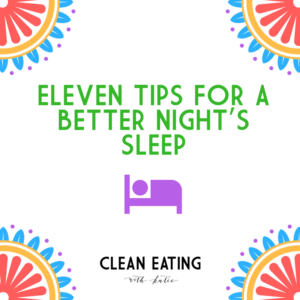Most Americans are under slept and without enough sleep we are setting ourselves up for unstable moods, hunger cravings, and ch allenges with weight loss. In fact, in Robb Wolf’s book, Wired to Eat
allenges with weight loss. In fact, in Robb Wolf’s book, Wired to Eat, he notes that Americans, on average sleep 2.5 hours less per night than Americans in the 1970’s. We often taught sleep deprivation like a badge of honor, but it is really a disservice to our health. Wolf also goes on to explain that in order for humans to deal with the stress of sleep deprivation, we are wired to seek out any food, especially highly processed foods. In fact, we have less willpower to resist these foods when we are sleep deprived. Lastly, Wolf goes on to point out there is a relationship between poor sleep and the inability to lose fat.
Five Tips to Improve Sleep
Room Conditions:
- As dark as a cave! Make sure your bedroom is as dark as a cave. Not only do your eyes have light receptors, but all of your skin does too.The light that is often emitted from electronics should be turned off or covered up. This includes clocks, night lights, TV, etc. Using electrical tape or a washcloth can help. I also LOVE sleeping with an eyemask. I have linked to my favorite Eye Mask
and my husband’s favorite eye mask (Blinks Luxury Ultralight Comfortable Contoured Eye Sleep Mask
). Blackout Curtains are something else that I HIGHLY recommend. Here is a link to my favorite brand, Eclipse.
Cool it Now! Your body temperature needs to fall a degree or two for optimal sleep and so your bedroom must also have a lower temperature. Between 64°- 66° is the optimal bedroom temperature according to Wolf.
Supplements:
Magnesium naturally relaxes the body and reduces stress. A supplement like Natural Vitality Natural Calm Magnesium is great way to get magnesium citrate.
Vitamin D can be hard to get enough of in our modern lifestyles due to indoor living and loads of sunscreen. A Vitamin D3 Liquid Supplement can be helpful for improving sleep.
* Be sure to discuss supplements with your doctor before taking any new supplements.
Bedtime Routine:
Folks with children know that bedtime routines really help with getting a restful night’s sleep. The same is true for adults. Having a consistent and regular bedtime along with a regular routine (that hopefully doesn’t involve screen time) will help power down your brain and get your body ready for sleep.
Additional Resources:
Go To Bed by Dr. Sarah Ballantyne https://www.thepaleomom.com/books/gotobed/


 I originally wrote this as a handout for my
I originally wrote this as a handout for my